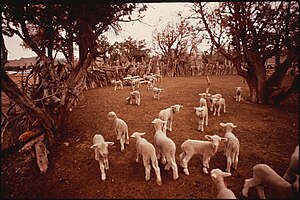Williams v. Lee
[3] The 1849 treaty was immediately suspect among tribal members because of the actions of Colonel John Macrae Washington that resulted in the death of Navajo leader Narbona.
[fn 1][5] With relations strained, in 1862 the United States began a military campaign under Kit Carson to remove the tribe from the mountains of Arizona[fn 2] to the Bosque Redondo on the Pecos River near present-day Fort Sumner, New Mexico, which resulted in the Long Walk of the Navajo, removing the tribe from their home and relocating them to eastern New Mexico.
The BIA then began an aggressive stock reduction program that reminded many Navajo of the imprisonment at the Bosque Redondo and was opposed by the tribe.
[18] In 1949, Congress passed the Navajo-Hopi Rehabilitation bill; its Fernandez Amendment which would have granted the states jurisdiction over tribal lands.
[19] President Harry S. Truman vetoed the bill and requested Congress to send it back to him without the Fernandez Amendment, which it did the following year.
[21] After the return from the Bosque Redondo, Army sutlers at the military posts such as Fort Defiance, Arizona began to trade extra rations for Navajo wool.
[25] The traders had a monopoly and created a virtual system of debt bondage by being the only ones to offer credit for goods needed by tribal members.
In 1952, Lee filed a lawsuit[32] in the Superior Court of Apache County, Arizona and obtained a writ of attachment for sheep belonging to Williams.
In the meantime, Lee was granted an order authorizing the Apache County Sheriff to sell at auction the sheep belonging to Williams.
The court held that the state had jurisdiction to hear civil cases involving Indians and non-Indians since there was no Congressional prohibition against it.
[34] Williams then appealed to the United States Supreme Court, which agreed to hear the case and issued a writ of certiorari.
Littell argued that Congress had plenary power to end tribal immunity but had not done so, and other federal laws preempted state jurisdiction.
[fn 8] Black observed, "Significantly, when Congress has wished the States to exercise this power it has expressly granted them the jurisdiction which Worcester v. Georgia had denied.




